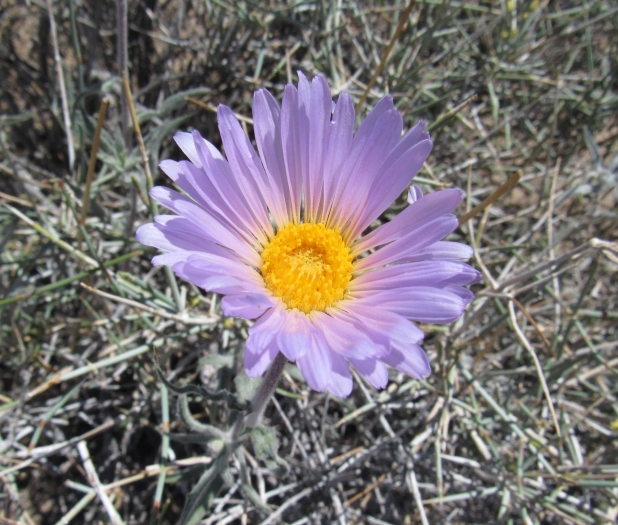Mojave Aster
(Xylorhiza tortifolia)
Mojave Aster (Xylorhiza tortifolia)
/
/

Wendy McCrady
CC BY 4.0
Image By:
Wendy McCrady
Recorded By:
Copyright:
CC BY 4.0
Copyright Notice:
Photo by: Wendy McCrady | License Type: CC BY 4.0 | License URL: http://creativecommons.org/licenses/by/4.0/ | Rights Holder: Wendy McCrady | Publisher: iNaturalist | Date Created: 2017-04-05T12:12:37-07:00 |
























Estimated Native Range
Summary
Xylorhiza tortifolia, commonly known as Mojave aster, is a perennial herb or subshrub native to the arid desert scrub and rocky slopes of the Mojave Desert, Sonoran Desert, and Great Basin Desert in the southwestern United States. It thrives at elevations between 787 and 6562 feet, where it is adapted to survive in harsh, dry conditions with poor, sandy soils. The plant typically reaches 24-31 inches in height and is characterized by its spiny, gray-green leaves and showy daisy-like flowers with lavender, pale blue, or white petals surrounding a yellow center. The bloom period extends from March to June, during which the flowers attract a variety of pollinators.
Mojave aster is valued for its drought tolerance and ability to add color to dry landscapes with its vibrant flowers. It is often used in native plant gardens, xeriscaping, and habitat restoration projects. In cultivation, it requires minimal water once established, well-drained soils, and full sun exposure to thrive. While it is not commonly afflicted by diseases, overwatering can lead to root rot. The Havasupai people have traditionally used Mojave aster for incense and fragrance, highlighting its cultural significance.CC BY-SA 4.0
Mojave aster is valued for its drought tolerance and ability to add color to dry landscapes with its vibrant flowers. It is often used in native plant gardens, xeriscaping, and habitat restoration projects. In cultivation, it requires minimal water once established, well-drained soils, and full sun exposure to thrive. While it is not commonly afflicted by diseases, overwatering can lead to root rot. The Havasupai people have traditionally used Mojave aster for incense and fragrance, highlighting its cultural significance.CC BY-SA 4.0
Plant Description
- Plant Type: Herb, Subshrub
- Height: 1-2 feet
- Width: 1-2 feet
- Growth Rate: Moderate
- Flower Color: Purple
- Flowering Season: Spring
- Leaf Retention: Deciduous
Growth Requirements
- Sun: Full Sun
- Water: Low
- Drainage: Fast, Medium
Common Uses
Butterfly Garden, Drought Tolerant, Low Maintenance, Rock Garden
Natural Habitat
native to the arid desert scrub and rocky slopes of the Mojave Desert, Sonoran Desert, and Great Basin Desert in the southwestern United States
Other Names
Common Names: Mojave Woody-Aster, Hurt-Leaf Woody-Aster
Scientific Names: , Xylorhiza tortifolia, Aster abatus, Aster gooddingii, Aster mohavensis, Aster tortifolius, Aster tortifolius var. funereus, Haplopappus tortifolius, Machaeranthera tortifolia, Machaeranthera tortifolia var. tortifolia
GBIF Accepted Name: